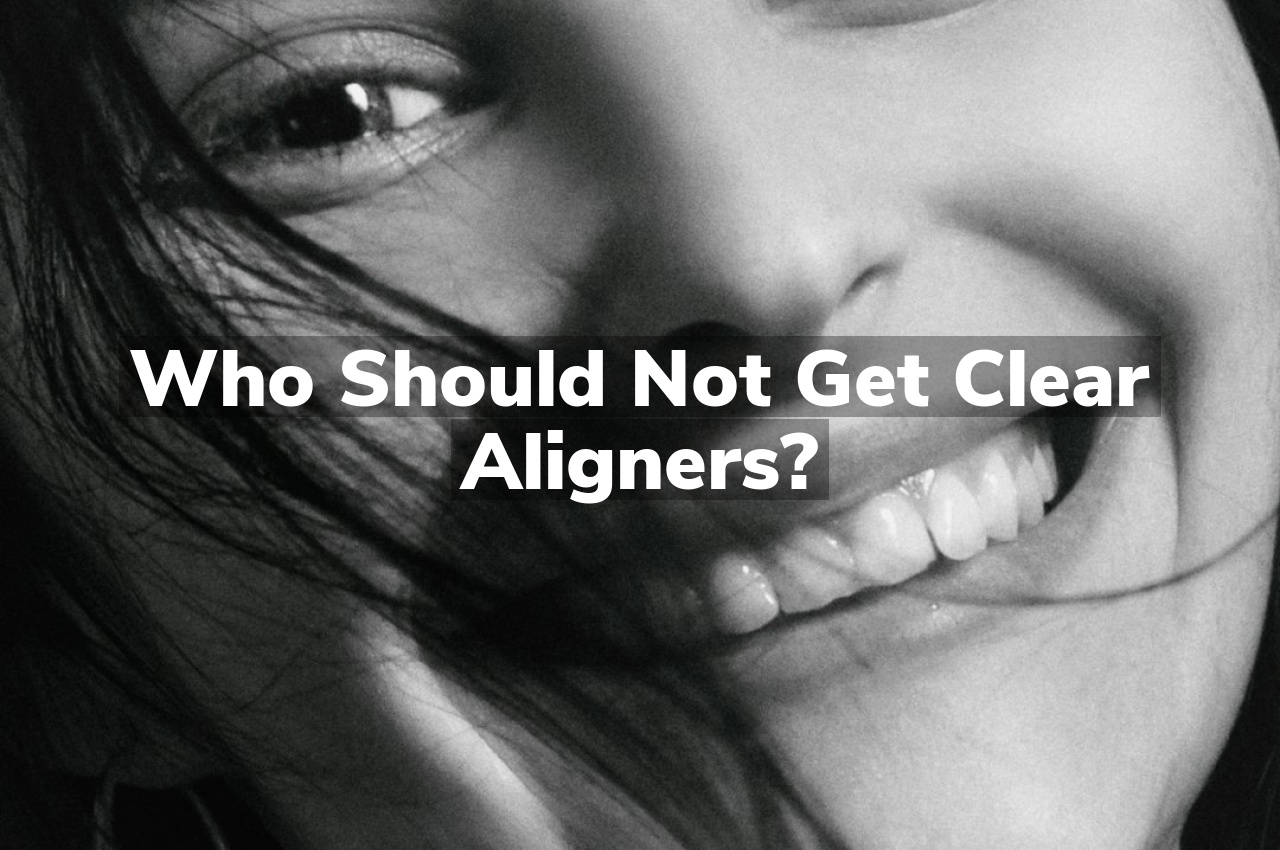Who should not get clear aligners? While many individuals can benefit from using clear aligners to adjust their teeth, they may not be suitable for everyone, particularly those with severe orthodontic issues or certain dental health concerns. It’s important to consider the specific circumstances and needs of each individual when exploring whether to get clear aligners.
Why You Should Get Clear Aligners Today?
Considering a smile makeover? Clear aligners can be your answer! These near-invisible trays gradually straighten your teeth, giving you the confidence boost you deserve. Unlike braces, they’re removable for easy eating and cleaning, and they won’t irritate your mouth. With clear aligners, you can improve your oral health and show off a straighter smile – all without anyone noticing you’re in treatment. Start your journey to a confident smile today!
Severe Teeth Misalignment Cases
When considering whether to get clear aligners, it’s important to understand their limitations, especially in severe teeth misalignment cases. Clear aligners are typically designed for mild to moderate dental corrections. For individuals with significant misalignment or complex bite issues, these aligners might not be the most effective option. The effectiveness of clear aligners largely depends on the specific alignment issues they need to address.
In cases of severe misalignment, the required movement of teeth and jaw might exceed what clear aligners can achieve. It’s crucial to have a proper assessment by a dental professional to determine the suitability of any orthodontic treatment. For more information on the capabilities of these devices, you might want to read about How Quickly Do Clear Aligners Work. This can provide insight into the general effectiveness and limitations of clear aligners in various dental scenarios.
Young Children with Developing Teeth
Young children with developing teeth are generally not ideal candidates to get clear aligners. During childhood, dental structures are still in the formative stages, and the jaw and teeth continue to grow and shift. Introducing aligners at this stage could potentially interfere with the natural development process of a child’s oral anatomy.
It is crucial to consider the ongoing changes in a child’s mouth before deciding on any dental adjustments. For more information on the suitability of different dental solutions, Discover Clear Aligners in Monrovia.
Individuals with Poor Oral Hygiene
Individuals with poor oral hygiene might find it challenging to get clear aligners. Maintaining clean teeth and gums is crucial when using any dental device that sits directly against the mouth’s soft tissues for extended periods. Accumulation of plaque and bacteria can lead to dental issues, which are exacerbated by aligners if proper oral hygiene is not practiced. Therefore, it’s important for anyone considering to get clear aligners to evaluate their current dental health and hygiene practices.
Patients with Unresolved Dental Issues
Individuals considering whether to get clear aligners should be aware that existing dental problems can complicate the process. For those with unresolved dental issues such as cavities, gum disease, or even a misaligned jaw, it’s crucial to address these conditions first. Clear aligners are designed for straightening teeth but are not suitable for treating underlying dental problems. Ensuring that all dental health issues are managed properly is essential before proceeding with any orthodontic treatment.
For more information on dental health, visit Monrovia Dentist at Healthy Life Dental.
Those with Certain Gum Diseases
Individuals diagnosed with certain gum diseases might find that they are not ideal candidates to get clear aligners. Gum health is crucial as it supports and surrounds the teeth, playing a significant role in the overall success of dental alignment treatments. When the gums are not in a healthy state, the shifting of teeth, which is necessary for aligners to be effective, might lead to further dental complications. Therefore, it’s important for those with gum diseases to consider their specific conditions when exploring dental alignment options.
People Allergic to Plastic Materials
If you are considering whether to get clear aligners, it’s crucial to consider any allergies you might have, particularly to plastic materials. Clear aligners are typically made from medical-grade plastic, which can trigger reactions in individuals with sensitivities to such materials. Symptoms can range from mild discomfort to severe allergic reactions. Before you decide to get clear aligners, consult with your orthodontist and possibly an allergist to ensure that the materials used will not adversely affect your health. This precaution helps in making an informed decision, safeguarding your well-being while aiming for a straighter smile.
Individuals with Temporomandibular Joint Disorder
If you suffer from Temporomandibular Joint Disorder (TMJ), you might want to think twice before deciding to get clear aligners. TMJ affects the joint that connects your jaw to your skull, leading to pain and dysfunction in the jaw joint and muscles that control jaw movement. The use of clear aligners requires significant manipulation of your jaw position, which can exacerbate TMJ symptoms and potentially lead to increased discomfort or further complications. It’s crucial to consult with a dental or medical professional who understands your TMJ history before proceeding to get clear aligners, ensuring that your treatment plan is safe and tailored to your specific health needs.
Patients Needing Vertical Tooth Movements
If you’re considering whether to get clear aligners, it’s crucial to understand their limitations, especially for specific dental needs. Patients needing vertical tooth movements may find that clear aligners are not the most effective option. Unlike traditional braces, clear aligners may struggle to achieve the necessary force for moving teeth up or down within the jawline. This is particularly relevant for cases where significant bite adjustment is needed. Therefore, individuals with such dental conditions should consult with an orthodontist to explore alternatives that might better suit their treatment goals.
Those with Complex Bite Issues
If you’re considering whether to get clear aligners, it’s crucial to understand that they might not be suitable for everyone. Specifically, individuals with complex bite issues, such as severe overbite, underbite, crossbite, or significant teeth misalignment, may require more advanced orthodontic treatment. Clear aligners are typically designed for mild to moderate dental corrections and might not effectively address more complicated dental problems. In such cases, traditional braces or specialized orthodontic procedures might be recommended to ensure proper alignment and bite correction. Always consult with an orthodontist to determine the best treatment plan for your specific needs before deciding to get clear aligners.
Conclusion
If you’re considering whether to get clear aligners, it’s important to consult with a professional. Call us at (626) 256-3368 or read our reviews on Google Maps.





